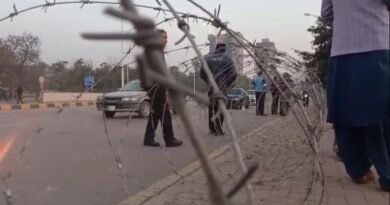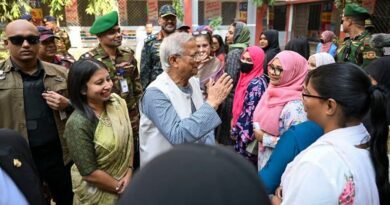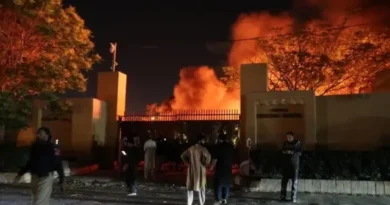Khan Faces “End of the Road” As Pakistan Army Cracks Down
Holed up at his fortified home in Lahore’s upmarket Zaman Park, Imran Khan is looking increasingly besieged and isolated as Pakistan’s military instigates a sweeping crackdown against the former prime minister’s political party.
Following unprecedented attacks against military-owned properties and widespread protests after Khan was briefly jailed earlier this month, more than 10,000 people linked to Khan’s Pakistan Tehreek-e-Insaf, or Movement for Justice, have been arrested in police raids. Several prominent leaders are now in jail and more than two dozen PTI stalwarts have quit the party this week.
Publicly the army and the government say they are holding accountable anyone who attacked state-owned property. Behind the scenes, however, there’s a recognition that Khan’s popularity is unmatched and his party must be cut down to size ahead of elections due in October at the latest, according to two people familiar with the military’s thinking.
Pakistan’s military didn’t respond to a request for comment.
Since his ousting as prime minister last year following a parliamentary no-confidence vote, Khan has campaigned relentlessly for fresh elections. He has blasted the unwieldy coalition headed by Prime Minister Shehbaz Sharif – who is seen as more amenable to the army even though his brother was once ousted in a coup – as a corrupt force of self-serving dynastic parties.
Khan’s charismatic, everyman quality, past cricketing victories and more recent embrace of pious religion – despite his elite upbringing and earlier playboy lifestyle – has seen his popularity soar across Pakistani society, including many of the army’s rank-and-file. An opinion poll published by Gallup earlier this year found that Khan’s approval rating jumped to 61% in February from 36% in January last year, while Sharif’s fell to 32% from 51% in that time.
That poses a major dilemma for the military brass. Khan would win an election by a landslide with no “credible alternative” for the army to back, according to Tim Willasey-Wilsey, a senior associate fellow at the Royal United Services Institute for Defence and Security Studies in London.
With Pakistan’s more than 240 million people grappling with record inflation and the country on the verge of default thanks to stalled bailout talks with the International Monetary Fund, the military is unlikely to boot out the elected government and take direct control. Pakistan’s last coup leader, General Pervez Musharraf, stepped down as a deeply unpopular and diminished figure fifteen years ago.
Pakistan’s rupee slid to a record-low 299 per dollar this month while dollar bonds are trading at distressed levels. The currency has lost about 20% this year, among the worst performers in the world.
“The army’s problem is that every measure against Imran will add to his popularity,” said Willasey-Wilsey. “It could also lead to divisions amongst the Corps Commanders who will be anxious about alienating the army from the people – the army will doubtless contemplate intervention options short of a coup, including delaying elections.”
Khan’s relationship with the military wasn’t always so fractious. After coming to power he openly conceded that the forces, which enjoy an over-sized defense budget and wide-ranging business interests across Pakistan, had a role to play in governing the country. But that relationship began unraveling in 2021 as Khan’s anti-American rhetoric pushed the country further away from the US as the economy deteriorated, drawing Islamabad closer to Russia and China.
(inputs NDTV )




